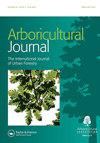美国城市林业的志愿者参与:文献回顾
Q3 Agricultural and Biological Sciences
引用次数: 8
摘要
摘要:本文回顾了美国城市林业志愿服务的相关文献。所探讨的主题是从研究综述中归纳出来的,包括“志愿者人口统计”、“志愿者的动机”、“志愿服务的好处”、“志愿者参与和障碍”、“志愿服务的价值”和“志愿者招募和保留”。城市林业志愿者通常是出于个人、社会和环境方面的考虑。城市林业的志愿者可能不能代表他们所服务的社区的一个横截面,而往往是受过良好教育的中年白人妇女。需要进行进一步的研究,以确定志愿服务的障碍,并加强今后征聘和留住志愿人员的努力。在美国,志愿者在城市森林的市政树木护理中占5%,价值约为3500万美元。志愿者执行关键的城市林业相关任务,旨在通过树木选择和种植工作增加城市树冠覆盖率。志愿者通过倡导和执行重要的维护相关职责,包括补充浇水和城市树木修剪的管理,鼓励城市树木的生存。在适当的培训和支持下,志愿者可以准确地进行重要的数据收集工作,为管理决策和城市树木养护计划提供信息。本文章由计算机程序翻译,如有差异,请以英文原文为准。
Volunteer engagement in urban forestry in the United States: reviewing the literature
ABSTRACT This article presents the results of a literature review related to volunteerism in urban forestry in the United States. Themes explored were inductively emergent from the research reviewed and included ‘volunteer demographics’, ‘motivations of volunteers’, ‘benefits of volunteering’, ‘volunteer engagement and barriers’, ‘value of volunteering’, and ‘volunteer recruitment and retention’. Urban forestry volunteers are often motivated by personal, social, and environmental considerations. Volunteers in urban forestry may not be representative of a cross-section of the communities that they are serving, rather they are often middle-aged, well-educated white women. Further research is required both to ascertain barriers to volunteerism and to enhance future volunteer recruitment and retainment efforts. Volunteers in the United States account for 5% of municipal tree care in urban forests – accounting for an estimated $35 million USD in value. Volunteers perform critical urban forestry-related tasks that aim to increase urban tree canopy cover through tree selection and planting efforts. Volunteers encourage urban tree survival by advocating for, as well as performing, important maintenance-related duties including the administration of supplemental watering and urban tree pruning. With proper training and support, volunteers may accurately perform important data collection efforts that may inform management decisions and urban tree care maintenance programmes.
求助全文
通过发布文献求助,成功后即可免费获取论文全文。
去求助
来源期刊

Arboricultural Journal
Agricultural and Biological Sciences-Agronomy and Crop Science
CiteScore
2.40
自引率
0.00%
发文量
28
期刊介绍:
The Arboricultural Journal is published and issued free to members* of the Arboricultural Association. It contains valuable technical, research and scientific information about all aspects of arboriculture.
 求助内容:
求助内容: 应助结果提醒方式:
应助结果提醒方式:


